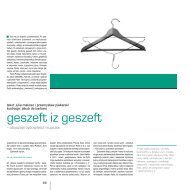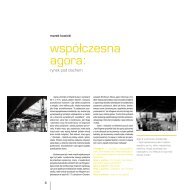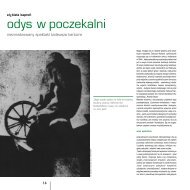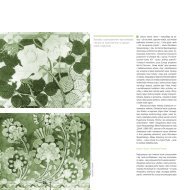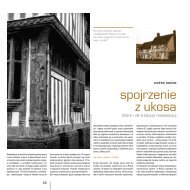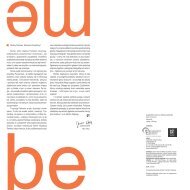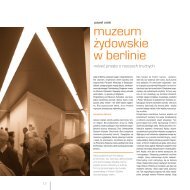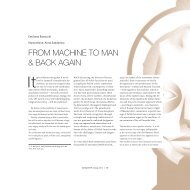is a crisis of utopia and utopian thinking under way? if ... - Autoportret
is a crisis of utopia and utopian thinking under way? if ... - Autoportret
is a crisis of utopia and utopian thinking under way? if ... - Autoportret
Create successful ePaper yourself
Turn your PDF publications into a flip-book with our unique Google optimized e-Paper software.
Cr<strong>is</strong><strong>is</strong> <strong>of</strong> Utopia? Editorial quEstionnairE<br />
<strong>is</strong> a cr<strong>is</strong><strong>is</strong> <strong>of</strong> <strong>utopia</strong> <strong>and</strong> <strong>utopia</strong>n <strong>thinking</strong><br />
<strong>under</strong> <strong>way</strong>? <strong>if</strong> so, what are the reasons <strong>of</strong> th<strong>is</strong><br />
phenomenon, <strong>and</strong> <strong>if</strong> not, where can be the<br />
source <strong>of</strong> contemporary <strong>utopia</strong>? – these are<br />
the questions we asked Pol<strong>is</strong>h <strong>and</strong> foreign<br />
intellectuals: social scient<strong>is</strong>ts, philosophers,<br />
theoreticians <strong>and</strong> practitioners <strong>of</strong> architecture<br />
<strong>and</strong> urban planning, critics <strong>and</strong> art h<strong>is</strong>torians,<br />
<strong>and</strong> h<strong>is</strong>torians. although the number <strong>of</strong> opinions<br />
presented here <strong>is</strong> finite, we could continue to<br />
collect them endlessly – there are as many<br />
<strong>utopia</strong>s as thinkers. We hope that the multitude<br />
<strong>of</strong> opinions gathered below will be a departure<br />
point to <strong>under</strong>st<strong>and</strong> modernity <strong>and</strong> inspiration<br />
for attempts at planning future. Illustrations: Anna Zabdyrska
Anthony Vidler<br />
The cr<strong>is</strong><strong>is</strong> <strong>of</strong> <strong>utopia</strong>/<strong>utopia</strong>n <strong>thinking</strong> was brought about<br />
by the architects’ v<strong>is</strong>ion that <strong>utopia</strong> could be designed<br />
<strong>and</strong> planned. Utopia, architects thought from the 18 th<br />
century to the late 1960s, could be brought about by<br />
architecture. The failure <strong>of</strong> th<strong>is</strong> v<strong>is</strong>ion caused a decline<br />
<strong>and</strong> rejection <strong>of</strong> <strong>utopia</strong>n thought in architecture in favor<br />
<strong>of</strong> a pragmatic view <strong>of</strong> pr<strong>of</strong>essional practice <strong>and</strong> its<br />
role in the development <strong>of</strong> neo-liberal capital<strong>is</strong>t society.<br />
At its best <strong>utopia</strong>n thought <strong>and</strong> design was critical <strong>of</strong><br />
capital<strong>is</strong>m, sometimes rejecting the neo-liberal model<br />
<strong>of</strong> society altogether – even Thomas More env<strong>is</strong>aged<br />
a communitarian system. The fall <strong>of</strong> the Berlin Wall,<br />
the proclaimed death <strong>of</strong> commun<strong>is</strong>m <strong>and</strong> Marx, fin<strong>is</strong>hed<br />
<strong>utopia</strong>n thought very quickly. Perhaps one might say<br />
that <strong>utopia</strong>n thought killed the possibility <strong>of</strong> <strong>utopia</strong>n<br />
thought?<br />
As for the present, Fredric Jameson has proposed that<br />
<strong>utopia</strong>n thought whether in prose or design can <strong>of</strong>fer<br />
alternatives in a time <strong>of</strong> lock-down <strong>and</strong> melt down. Perhaps<br />
th<strong>is</strong> <strong>is</strong> true, but for th<strong>is</strong> to happen, architects have<br />
to regain their sense <strong>of</strong> social responsibility, <strong>and</strong> their<br />
political sanity, vote for a world ruled by communitarian<br />
<strong>and</strong> social<strong>is</strong>t ethics <strong>and</strong> practices, <strong>and</strong> not for a world<br />
ruled by the myth that the next technological d<strong>is</strong>covery<br />
will provide a solution. In William Morr<strong>is</strong>’s “News from<br />
Nowhere” the society <strong>is</strong> served by technology that stays<br />
well in the background; technology ruled by community<br />
<strong>and</strong> not by investment <strong>and</strong> pr<strong>of</strong>it.<br />
New York, 29 April 2011 1<br />
anthony vidler – Pr<strong>of</strong>essor <strong>and</strong> Dean <strong>of</strong> Irwin S.<br />
Chanin School <strong>of</strong> Architecture at The Cooper Union in<br />
New York, the author <strong>of</strong>: Warped Space: Art, Architecture,<br />
<strong>and</strong> Anxiety in Modern Culture (2002) <strong>and</strong> H<strong>is</strong>tories <strong>of</strong> the Immediate<br />
Present: Inventing Architectural Modern<strong>is</strong>m (2008).<br />
1 The dates given <strong>under</strong> each comment are the dates they were received<br />
by the editors.<br />
hAl Foster<br />
The sheer d<strong>if</strong>ficulty <strong>of</strong> the present − in sociopolitical,<br />
economic, <strong>and</strong> ecological terms − makes <strong>utopia</strong>n<br />
thought more urgent, more real, not less. As the students<br />
<strong>of</strong> ‘68 said in Par<strong>is</strong>: “soyons real<strong>is</strong>tes, dem<strong>and</strong>ons<br />
l’impossible.”<br />
30 April 2011<br />
hal foster − b. 1955, Pr<strong>of</strong>essor <strong>of</strong> Art <strong>and</strong> Archaeology<br />
at Princeton University, specializing in modern<br />
art <strong>and</strong> architecture h<strong>is</strong>tory, publ<strong>is</strong>hed among others:<br />
The Return <strong>of</strong> the Real (1996), edited a seminal collection<br />
<strong>of</strong> essays on postmodern<strong>is</strong>m, The Anti-Aesthetic: Essays on<br />
Postmodern Culture (1983).
tAdeusz słAWek<br />
Utopia gives <strong>thinking</strong> a particular emphas<strong>is</strong>. By looking<br />
closely at everyday circumstances, at the d<strong>is</strong>appointment<br />
evoked by ex<strong>is</strong>ting reality as opposed to what it<br />
might be, <strong>utopia</strong> directs <strong>thinking</strong> towards the future<br />
which could eradicate those shortcomings <strong>and</strong> deficiencies.<br />
However, what <strong>is</strong> the most valuable in the <strong>utopia</strong>n<br />
diacritic <strong>of</strong> <strong>thinking</strong> <strong>is</strong> the conviction that its strength<br />
<strong>is</strong> a pr<strong>of</strong>oundly critical reflection on the present state <strong>of</strong><br />
things. Utopia does not intend to set an aim by means<br />
<strong>of</strong> the model reality it describes; <strong>if</strong> th<strong>is</strong> were the case,<br />
it would soon turn into a dangerous instrument <strong>of</strong> ideological<br />
manipulation (examples may easily be pointed<br />
out). The <strong>utopia</strong>n <strong>way</strong> <strong>of</strong> <strong>thinking</strong> <strong>is</strong>, first <strong>and</strong> foremost,<br />
a <strong>way</strong> that <strong>is</strong> critical <strong>of</strong> the world which <strong>is</strong> either<br />
pleased with itself or convinced that it has reached everything<br />
that was achievable in a given situation. Utopia<br />
<strong>is</strong>, then, a kind <strong>of</strong> unique dialect, a peculiar articulation<br />
<strong>of</strong> thought: we <strong>under</strong>st<strong>and</strong> what <strong>utopia</strong> refers to (i.e. the<br />
imperfection <strong>of</strong> our means to organ<strong>is</strong>e the world) but at<br />
the same time our <strong>under</strong>st<strong>and</strong>ing contains an element<br />
<strong>of</strong> warning (against accepting the described model <strong>of</strong><br />
the future as the ideal <strong>and</strong> the only binding one). What<br />
a <strong>utopia</strong> formulates <strong>is</strong> not a programme for a readymade<br />
‘so it must be’ future but a critical assessment <strong>of</strong><br />
the situation (‘so it should not be’) which opens a broad<br />
horizon for the future. Utopian <strong>thinking</strong> <strong>is</strong> then a form<br />
<strong>of</strong> a never fulfilled prophecy (<strong>if</strong> it did become fulfilled,<br />
it would lose the power <strong>of</strong> hope), a never real<strong>is</strong>ed future<br />
(should it be real<strong>is</strong>ed, it would cease to be future <strong>and</strong><br />
would become another highly imperfect present).<br />
Th<strong>is</strong> line <strong>of</strong> <strong>thinking</strong>, which <strong>is</strong> character<strong>is</strong>tic for <strong>utopia</strong>,<br />
makes politicians d<strong>is</strong>trustful <strong>and</strong> reluctant to it. It <strong>is</strong>,<br />
after all, contrary to two fundamental postulates <strong>of</strong><br />
their activity: to weaken the role <strong>of</strong> critical reflection<br />
on the state <strong>of</strong> things <strong>and</strong> to convince all <strong>of</strong> the finite<br />
pragmatic nature <strong>of</strong> politics. To those in power, being<br />
critical <strong>of</strong> the state <strong>of</strong> things must inherently involve<br />
being wary <strong>and</strong> conservative; <strong>if</strong> one goes too far, the<br />
foundations <strong>of</strong> the political party structure are threatened.<br />
Opposition in turn subjects the reality organ<strong>is</strong>ed<br />
by the current authorities to critic<strong>is</strong>m that <strong>is</strong> based not<br />
so much on a substantive d<strong>is</strong>pute but on the very fact<br />
that it <strong>is</strong> a reality <strong>of</strong> someone else’s power rather than<br />
their own. In both cases critic<strong>is</strong>m loses its solid, creative<br />
base. Narrowly <strong>under</strong>stood, pragmat<strong>is</strong>m <strong>of</strong> power, whose<br />
main aim <strong>is</strong> to keep it, will desperately strive to ward<br />
<strong>of</strong>f all sorts <strong>of</strong> v<strong>is</strong>ionary, projective <strong>thinking</strong> in politics.<br />
Th<strong>is</strong> kind <strong>of</strong> <strong>thinking</strong> assumes that politics <strong>is</strong> a spiritual<br />
‘project’, a direction <strong>of</strong> activities, movement towards an<br />
unreal<strong>is</strong>able dream <strong>of</strong> perfection, a never-to-be-fulfilled<br />
prom<strong>is</strong>e. The world in which the word ‘prom<strong>is</strong>e’ has lost<br />
its spiritual dimension <strong>and</strong> has become merely a bargaining<br />
card in the election play does not favour <strong>utopia</strong>.<br />
9 May 2011<br />
tadeusz sławek, b. 1946, <strong>is</strong> a poet, translator <strong>and</strong><br />
essay writer. He <strong>is</strong> a pr<strong>of</strong>essor <strong>of</strong> Engl<strong>is</strong>h <strong>and</strong> American<br />
literature, <strong>and</strong> the head <strong>of</strong> the Department <strong>of</strong> Comparative<br />
Literature at the University <strong>of</strong> Silesia in Katowice.<br />
hAyden White<br />
Yes, there <strong>is</strong> a cr<strong>is</strong><strong>is</strong> <strong>of</strong> <strong>utopia</strong>/<strong>utopia</strong>n <strong>thinking</strong>.<br />
Th<strong>is</strong> <strong>is</strong> because <strong>utopia</strong> <strong>is</strong>, as Fredric Jameson has argued,<br />
a literary genre which projects an imaginary resolution<br />
on conflicts caused by the coincidence <strong>of</strong> two or more<br />
d<strong>if</strong>ferent modes or production <strong>and</strong> the social relations<br />
engendered by them at a particular time <strong>and</strong> place in<br />
h<strong>is</strong>tory.<br />
Thomas More’s Utopia, the paradigm <strong>of</strong> <strong>utopia</strong>n <strong>thinking</strong><br />
in the modern West, remained important for as long as<br />
the older feudal-agrarian system retained some authority<br />
in the capital<strong>is</strong>t-urban world emerging during h<strong>is</strong><br />
time. Now, with the last vestiges <strong>of</strong> the Old Regime <strong>of</strong><br />
pre-capital<strong>is</strong>t times little more than a vague memory in<br />
the West, the kind <strong>of</strong> <strong>utopia</strong> env<strong>is</strong>ioned by More has lost<br />
whatever relevance it enjoyed up to World War I.<br />
The <strong>utopia</strong>s <strong>of</strong> the future will be built upon the conflict<br />
between advanced capital<strong>is</strong>m <strong>and</strong> whatever remains<br />
<strong>of</strong> the older nation-state which was an incarnation <strong>of</strong><br />
advanced capital<strong>is</strong>m’s earlier political face. Global<strong>is</strong>m<br />
creates a cr<strong>is</strong><strong>is</strong> especially for law within the limits <strong>of</strong><br />
the nation-state alone. With the dem<strong>is</strong>e <strong>of</strong> the nationstate<br />
as anything other than an expression <strong>of</strong> multinational<br />
corporate power, the dem<strong>is</strong>e <strong>of</strong> the authority <strong>of</strong><br />
law itself must follow; because the nation-state was the<br />
last bastion <strong>of</strong> legality itself.<br />
Advanced capital<strong>is</strong>m presupposes the subordination <strong>of</strong><br />
every legal system to the imperatives <strong>of</strong> pr<strong>of</strong>iteering.<br />
The <strong>utopia</strong> <strong>of</strong> the future will be based on a nostalgia for<br />
the rule <strong>of</strong> law considered as superior to the state <strong>and</strong><br />
the corporation. Nihil<strong>is</strong>m <strong>is</strong> the reality <strong>of</strong> the absence<br />
<strong>of</strong> a rule <strong>of</strong> law that might be something other than an<br />
expression <strong>of</strong> current financial practice.<br />
First, divine law goes. Then natural law goes. Then positive<br />
law goes. What will be left? Utopia as the memory<br />
<strong>of</strong> the possibility <strong>of</strong> legality.<br />
15 May 2011<br />
hayden white <strong>is</strong> a h<strong>is</strong>torian <strong>and</strong> theor<strong>is</strong>t <strong>of</strong> h<strong>is</strong>toriography,<br />
pr<strong>of</strong>essor emeritus <strong>of</strong> the University <strong>of</strong> Cal<strong>if</strong>ornia,<br />
Santa Cruz <strong>and</strong> Stanford University. H<strong>is</strong> works include<br />
Metah<strong>is</strong>tory: The H<strong>is</strong>torical Imagination in Nineteenth-Century<br />
Europe (1973)
MArc Augé<br />
Philosopher Jean-Franço<strong>is</strong> Lyotard was the first to<br />
refer to ‘the end <strong>of</strong> gr<strong>and</strong> narratives’, those collective<br />
v<strong>is</strong>ions <strong>of</strong> the future that were so character<strong>is</strong>tic for the<br />
19 th century, whose failure was sanctioned by the 20 th<br />
century totalitarian<strong>is</strong>ms. The gr<strong>and</strong> liberal narrative<br />
has also been struggling with obstacles, <strong>and</strong> we are not<br />
at all certain whether ‘the end <strong>of</strong> h<strong>is</strong>tory’ described by<br />
Fukuyama (expansion <strong>of</strong> free market <strong>and</strong> representative<br />
democracy all over the world) <strong>is</strong> not an illusion: there<br />
are totalitarian regimes which adopt to the market<br />
economy extremely well, while the gap between the<br />
richest among the rich <strong>and</strong> the poorest among the poor<br />
continues to deepen both in developed <strong>and</strong> in developing<br />
<strong>and</strong> backward countries.<br />
The paradox cons<strong>is</strong>ts in the fact that the development<br />
<strong>of</strong> science <strong>is</strong> continuous, while the gap between those<br />
who have access to education <strong>and</strong> those whose access to<br />
it <strong>is</strong> limited <strong>is</strong> also deepening. The only <strong>utopia</strong> that may<br />
be formulated <strong>and</strong> real<strong>is</strong>ed <strong>is</strong> the <strong>utopia</strong> <strong>of</strong> education,<br />
the only one that prom<strong>is</strong>es true equality. It <strong>is</strong> a <strong>utopia</strong><br />
because we are not going in that direction but we can<br />
imagine the conditions for it to be real<strong>is</strong>ed, hoping that<br />
it will eventually become a source <strong>of</strong> prosperity. The<br />
development <strong>of</strong> the media, such as the Internet, should<br />
not be m<strong>is</strong>taken for that <strong>utopia</strong>. It will never play a role<br />
in that area <strong>if</strong> it <strong>is</strong> not accompanied by extensive educational<br />
programmes that will teach how not to confuse<br />
aims with means, <strong>and</strong> knowledge with consumption.<br />
Utopia today should focus on the individual <strong>and</strong> reach<br />
beyond the traditional opposition <strong>of</strong> freedom <strong>and</strong> real<br />
freedom.<br />
24 May 2011<br />
marc augé, b. 1935, <strong>is</strong> a French ethnolog<strong>is</strong>t <strong>and</strong> cultural<br />
anthropolog<strong>is</strong>t, pr<strong>of</strong>essor at the École des hautes<br />
études en sciences sociales in Par<strong>is</strong>. He put forward the<br />
notion <strong>of</strong> the non-place. H<strong>is</strong> works include Non-Places:<br />
Introduction to an Anthropology <strong>of</strong> Supermodernity, <strong>and</strong> Génie<br />
du pagan<strong>is</strong>me [The Spirit <strong>of</strong> Pagan<strong>is</strong>m].<br />
MArtin JAy<br />
Utopia <strong>is</strong> a concept that <strong>is</strong> al<strong>way</strong>s in cr<strong>is</strong><strong>is</strong>. It <strong>is</strong> motivated<br />
by an urgent feeling that the status quo, however it<br />
may be defined, cannot be allowed to continue. It rejects<br />
mere reforms or gradual improvements <strong>and</strong> posits the<br />
possibility <strong>of</strong> a radical alternative that will address<br />
root problems <strong>and</strong> provide fundamental solutions. It<br />
takes seriously the right to realize the desires, however<br />
outl<strong>and</strong><strong>is</strong>h, that the present order thwarts. And yet, at<br />
the same time, it <strong>is</strong> haunted by a fear that it lacks the<br />
means to bring about the imagined alternative, <strong>and</strong> by<br />
the realization that the transition to a redeemed world<br />
<strong>is</strong> virtually impossible to effect, at least by human efforts.<br />
The dual sense <strong>of</strong> <strong>utopia</strong> as a not-yet-ex<strong>is</strong>ting place<br />
<strong>of</strong> perfection <strong>and</strong> a naïve fantasy that can never be realized<br />
prevents the concept from ever shedding its sense<br />
<strong>of</strong> permanent cr<strong>is</strong><strong>is</strong>.<br />
Added to the perennial cr<strong>is</strong><strong>is</strong> <strong>of</strong> <strong>utopia</strong> as a generic<br />
concept <strong>is</strong> the h<strong>is</strong>torical lessons we have learned from<br />
attempts to force its realization. After the horrors <strong>of</strong><br />
the twentieth century, it <strong>is</strong> impossible not to adopt an<br />
immediately ironic, even cynical stance towards it. “No<br />
experiments” was the <strong>under</strong>st<strong>and</strong>able slogan adopted by<br />
many in the wake <strong>of</strong> the defeat or exhaustion <strong>of</strong> totalitarian<br />
<strong>utopia</strong>s. The line between <strong>utopia</strong> <strong>and</strong> dystopia,<br />
h<strong>is</strong>tory has taught us, <strong>is</strong> very porous <strong>and</strong> no one can<br />
be very confident that good intentions won’t produce<br />
nightmare outcomes. As a result, we have learned to<br />
be very cautious about embracing what the American<br />
h<strong>is</strong>torian Jay Winter has called “major <strong>utopia</strong>s” <strong>and</strong><br />
willing to accept only “minor” ones as plausible repositories<br />
<strong>of</strong> the desire for meaningful change. An excellent<br />
example, as another American h<strong>is</strong>torian Samuel Moyn<br />
has recently shown, <strong>is</strong> the international campaign to<br />
safeguard “human rights,” into which a lot <strong>of</strong> the <strong>utopia</strong>n<br />
energies <strong>of</strong> earlier movements have been directed.<br />
Rather than an imagined form <strong>of</strong> perfect l<strong>if</strong>e, they func-<br />
tion as a bulwark against the further impairment <strong>of</strong> our<br />
precarious lives. Although not sufficient as a politics,<br />
they are a necessary element in any politics that res<strong>is</strong>ts<br />
efforts to impose on us dystopias masking as <strong>utopia</strong>s. Ins<strong>of</strong>ar<br />
as even the most benign version <strong>of</strong> a major <strong>utopia</strong><br />
threatens to snuff out the endless struggle <strong>of</strong> competing<br />
values, aspirations <strong>and</strong> interests that <strong>is</strong> the l<strong>if</strong>eblood <strong>of</strong><br />
healthy politics, it <strong>is</strong> better to confine it to the no-place<br />
<strong>of</strong> our dreams.<br />
It would, <strong>of</strong> course, be a folly to ab<strong>and</strong>on entirely the<br />
exerc<strong>is</strong>e <strong>of</strong> our <strong>utopia</strong>n imaginations, however much we<br />
have learned about the r<strong>is</strong>ks <strong>of</strong> trying to realize them.<br />
The cr<strong>is</strong><strong>is</strong> <strong>of</strong> <strong>utopia</strong> must be <strong>under</strong>stood as a permanent<br />
state <strong>of</strong> emergency. For, to paraphrase with some license<br />
the brilliantly ambiguous title <strong>of</strong> Goya’s famous etching,<br />
El sueño de la razón produce monstruos, the sleep <strong>of</strong> the<br />
<strong>utopia</strong>n imaginary produces monsters.<br />
27 May 2011<br />
martin jay <strong>is</strong> a pr<strong>of</strong>essor <strong>of</strong> h<strong>is</strong>tory at the University<br />
<strong>of</strong> Cal<strong>if</strong>ornia, Berkeley. H<strong>is</strong> research interests revolve<br />
around intellectual h<strong>is</strong>tory; in h<strong>is</strong> academic practice he<br />
refers to the achievements <strong>of</strong> the Frankfurt School <strong>and</strong><br />
to cultural research. H<strong>is</strong> works include Songs <strong>of</strong> Experience:<br />
Modern American <strong>and</strong> European Variations on a Universal Theme<br />
(2004). i amerykańskich wariacji na uniwersalny temat (2008).
zygMunt BAuMAn<br />
No cr<strong>is</strong><strong>is</strong>… Imagining a better l<strong>if</strong>e than the ex<strong>is</strong>ting<br />
one, a l<strong>if</strong>e that does not yet ex<strong>is</strong>t but one that could <strong>and</strong><br />
should ex<strong>is</strong>t – the eternal source <strong>of</strong> ‘<strong>utopia</strong>n <strong>thinking</strong>’<br />
that never runs dry – <strong>is</strong> as rich, <strong>and</strong> possibly even richer<br />
than at the time <strong>of</strong> Sir Thomas More who coined the<br />
name ‘<strong>utopia</strong>’ for it. Yet the content <strong>of</strong> these ideas has<br />
radically changed, <strong>and</strong> the hopes that they evoke <strong>and</strong> efforts<br />
that they stimulate have moved into an altogether<br />
d<strong>if</strong>ferent sphere.<br />
In order to coin the name, <strong>and</strong> particularly to usefully<br />
render the incurably dual<strong>is</strong>tic nature <strong>of</strong> a dream (‘it<br />
does not ex<strong>is</strong>t’ but ‘one would w<strong>is</strong>h it did’), More used<br />
ancient Greek (after all, the Greek prefix ‘u’, which<br />
denies the ex<strong>is</strong>tence <strong>of</strong> the thing that it precedes, <strong>and</strong><br />
‘eu’, which gives the thing a positive value, are pronounced<br />
in the same <strong>way</strong> in Engl<strong>is</strong>h), <strong>and</strong> chose a place<br />
to be the subject <strong>of</strong> dreams: a seat <strong>of</strong> a society, a remote<br />
city ‘far, far a<strong>way</strong>’ where the living conditions are radically<br />
d<strong>if</strong>ferent from those in everyday experience <strong>and</strong><br />
are much better suited to human desires than those<br />
experienced in daily l<strong>if</strong>e: the conditions in which all<br />
residents are sat<strong>is</strong>fied with the world in which they<br />
live because nobody suffers any injustice <strong>and</strong> everyone<br />
has been allotted a proper role to perform, so everyone<br />
likes doing what they were appointed to do by the w<strong>is</strong>e<br />
lawgiver. More’s choice harmon<strong>is</strong>ed with the ambitions<br />
<strong>of</strong> the forthcoming modernity: namely, with the intention<br />
to alter the ex<strong>is</strong>ting world into one that would be<br />
friendlier <strong>and</strong> safer to people, <strong>and</strong> more hospitable to<br />
mankind; one in which the vagaries <strong>of</strong> fortune would be<br />
replaced with a carefully <strong>and</strong> prudently planned lucid<br />
<strong>and</strong> <strong>under</strong>st<strong>and</strong>able system <strong>of</strong> human relations, rights<br />
<strong>and</strong> obligations. These ambitions were founded on the<br />
conviction that a good l<strong>if</strong>e was only possible in a good<br />
society, <strong>and</strong> that, <strong>if</strong> the aim <strong>of</strong> the intended transformation<br />
<strong>of</strong> the world was human happiness, then it was<br />
to be initiated in architect studios, planning a society<br />
that would be free from their all-too-well-known vices<br />
<strong>and</strong> afflictions: in short, that whims <strong>of</strong> nature, ind<strong>if</strong>ferent<br />
to human needs <strong>and</strong> dreams, ought to be replaced<br />
by order establ<strong>is</strong>hed by Reason. The order should be<br />
designed <strong>and</strong> approved by Reason <strong>and</strong> instituted by Reason’s<br />
plenipotentiaries - hence it should be perfect, or,<br />
in other words, one in which any further change would<br />
only be a change for the worse.<br />
What has changed in the h<strong>is</strong>tory <strong>of</strong> <strong>utopia</strong> <strong>and</strong> what <strong>is</strong><br />
(m<strong>is</strong>takenly) considered to be its ‘cr<strong>is</strong><strong>is</strong>’ <strong>is</strong> the sh<strong>if</strong>ting<br />
<strong>of</strong> expectations <strong>and</strong> ambitions for a better l<strong>if</strong>e from<br />
a seat <strong>of</strong> the society to a place set aside from the society<br />
by the bearers <strong>of</strong> the <strong>utopia</strong> for themselves (<strong>and</strong> perhaps<br />
their near <strong>and</strong> dear ones); a place appropriated, adapted<br />
<strong>and</strong> secured by them from the vagaries <strong>of</strong> fate. The<br />
dream <strong>is</strong> not <strong>of</strong> a ‘perfect society’ (few believe nowadays<br />
in the feasibility <strong>of</strong> such a society, <strong>and</strong> virtually no one<br />
prom<strong>is</strong>es that it can be reached through Reason) but <strong>of</strong><br />
one’s own comfortable trouble-free <strong>and</strong> pleasant niche.<br />
Like so many inherent aspects <strong>of</strong> human l<strong>if</strong>e, <strong>utopia</strong><br />
has <strong>under</strong>gone privat<strong>is</strong>ation... It <strong>is</strong> in keeping with the<br />
replacement <strong>of</strong> integrative ambitions <strong>of</strong> early modernity<br />
with the individual<strong>is</strong>ing tendency <strong>of</strong> its present phase;<br />
today, as Ulrich Beck aptly put it, individuals are expected<br />
to solve (for their own benefit, <strong>and</strong> at most – for<br />
the benefit <strong>of</strong> their near <strong>and</strong> dear ones) socially generated<br />
problems, by means <strong>of</strong> individual wit <strong>and</strong> cunning,<br />
individual resources <strong>and</strong> individually accessible means<br />
<strong>of</strong> action...<br />
Personally, I associate th<strong>is</strong> far-reaching transformation<br />
in the nature <strong>of</strong> <strong>utopia</strong> with the change <strong>of</strong> the most<br />
common, most ardently advocated <strong>and</strong> most frequently<br />
adopted attitude to l<strong>if</strong>e (not without intensive cooperation<br />
<strong>of</strong> consumer markets...): from the gardener’s<br />
posture to that <strong>of</strong> the hunter (I wrote about it extensively<br />
in the book Liquid Times: Living in an Age <strong>of</strong> Uncertainty<br />
publ<strong>is</strong>hed by Polity Press in 2007). While the gardener<br />
expects the carefully tended <strong>and</strong> lovingly cultivated<br />
garden to bear fruit, <strong>and</strong> takes onto himself co-responsibility<br />
for the permanence <strong>and</strong> beauty <strong>of</strong> the garden<br />
order, the hunter <strong>is</strong> concerned with the abundance <strong>of</strong><br />
game during the next hunting trip, <strong>and</strong> does not worry<br />
about the wellbeing <strong>of</strong> the forest – <strong>and</strong> certainly refuses<br />
to take responsibility for its permanence. Moreover,<br />
while the ‘gardener’s ‘ <strong>utopia</strong> <strong>of</strong>fers a prospect <strong>of</strong> a perfect<br />
order that crowns long <strong>and</strong> painstaking effort, the<br />
‘hunter’s’ <strong>utopia</strong> <strong>is</strong> a dream <strong>of</strong> a never-ending series <strong>of</strong><br />
hunting trips, hunting adventure <strong>and</strong> excitement...<br />
29 May 2011<br />
zygmunt bauman , b. 1925, <strong>is</strong> a philosopher, sociolog<strong>is</strong>t<br />
<strong>and</strong> essay writer. Pr<strong>of</strong>essor at the University <strong>of</strong><br />
Leeds, he <strong>is</strong> one <strong>of</strong> the creators <strong>of</strong> the concept <strong>of</strong> liquid/<br />
late modernity. H<strong>is</strong> works include Modernity <strong>and</strong> the Holocaust,<br />
Leg<strong>is</strong>lators <strong>and</strong> Interpreters, Social<strong>is</strong>m: the Active Utopia<br />
<strong>and</strong> Kultura w płynnej nowoczesności [Culture in liquid<br />
modernity.
PAnAyot<strong>is</strong> tournikiot<strong>is</strong><br />
Utopia has al<strong>way</strong>s been a tool for social critic<strong>is</strong>m, ra<strong>is</strong>ing<br />
from old <strong>and</strong> suffering cities <strong>and</strong> societies to address<br />
the prospect <strong>of</strong> an ideal future to be establ<strong>is</strong>hed in the<br />
ideal city. Cultural or collectiv<strong>is</strong>t, the ideal society <strong>and</strong><br />
the ideal city were written in books <strong>and</strong> exposed in<br />
Museums, to begin with Thomas More’s Utopia <strong>and</strong> Constant’s<br />
New Babylon. Utopian d<strong>is</strong>course was the sign <strong>of</strong><br />
the radical <strong>thinking</strong> <strong>of</strong> people who could not fit the rule<br />
<strong>of</strong> real l<strong>if</strong>e <strong>and</strong> were indirectly willing to make th<strong>is</strong> l<strong>if</strong>e<br />
change. Is there any cr<strong>is</strong><strong>is</strong> <strong>of</strong> <strong>utopia</strong>n <strong>thinking</strong> nowadays?<br />
My answer <strong>is</strong> yes <strong>and</strong> no!<br />
There <strong>is</strong> an inflation <strong>of</strong> <strong>utopia</strong>n simulacrum, an omnipresence,<br />
a virtual plethora. Utopia <strong>is</strong> everywhere!<br />
You don’t have to close your eyes <strong>and</strong> imagine the new<br />
<strong>utopia</strong>n worlds, somewhere in the south Pac<strong>if</strong>ic, Eden<br />
or elsewhere. You don’t have to think, to meditate, to<br />
study. Utopia <strong>is</strong> all present, moving <strong>and</strong> clinking around<br />
you, monitoring past <strong>and</strong> future l<strong>if</strong>e throughout, on the<br />
city walls, TV <strong>and</strong> laptop screens, <strong>and</strong> movies. Utopian<br />
gadgetry has occupied all <strong>of</strong> your real l<strong>if</strong>e <strong>and</strong> has<br />
changed it. You are actually living in the <strong>utopia</strong>n world<br />
<strong>of</strong> gr<strong>and</strong>pas!<br />
At the same time, there <strong>is</strong> a deep cr<strong>is</strong><strong>is</strong> <strong>of</strong> <strong>utopia</strong>n <strong>thinking</strong><br />
in the h<strong>is</strong>torical meaning <strong>of</strong> th<strong>is</strong> word. There <strong>is</strong> also<br />
a lack <strong>of</strong> critical <strong>thinking</strong> <strong>and</strong> social prospective. The<br />
prom<strong>is</strong>ed end <strong>of</strong> capital<strong>is</strong>m has ended to a universal<br />
liberal<strong>is</strong>m comm<strong>and</strong>ing a radically new social critique,<br />
breaking down with 19 th <strong>and</strong> 20 th century <strong>thinking</strong>.<br />
There <strong>is</strong> no <strong>is</strong>sue in reproducing the sound critique <strong>of</strong><br />
the same gr<strong>and</strong>pas to change retroactively th<strong>is</strong> world.<br />
We have to begin from scratch, liberating mind from all<br />
kind <strong>of</strong> establ<strong>is</strong>hed <strong>thinking</strong>, to rethink man <strong>and</strong> society<br />
<strong>and</strong> reinvent the means <strong>of</strong> critical <strong>under</strong>st<strong>and</strong>ing.<br />
In fact, there <strong>is</strong> no more Utopia, there <strong>is</strong> no unknown<br />
l<strong>and</strong>, no legendary fictional location synonymous with<br />
any earthly parad<strong>is</strong>e. We virtually know every piece<br />
<strong>of</strong> l<strong>and</strong> on th<strong>is</strong> world, every topos, but we do not really<br />
know our world. Utopia nowadays <strong>is</strong> reenacting cogito<br />
<strong>and</strong> facing the world we live to activate direct change.<br />
Athens, 4 June 2011<br />
panayot<strong>is</strong> tournikiot<strong>is</strong> <strong>is</strong> an architectural h<strong>is</strong>torian,<br />
ass<strong>is</strong>tant pr<strong>of</strong>essor at the Faculty <strong>of</strong> Architecture<br />
at the National Technical University in Athens. He has<br />
written The H<strong>is</strong>toriography <strong>of</strong> Modern Architecture (2001).<br />
JeAn-lou<strong>is</strong> cohen<br />
The present cr<strong>is</strong><strong>is</strong> <strong>of</strong> <strong>utopia</strong> has many origins, from the<br />
objective ones such as the collapse <strong>of</strong> the social<strong>is</strong>t ideal,<br />
even in the democratic forms it seemed sometimes to be<br />
able to embody, to the subjective ones such as the emergence<br />
<strong>of</strong> the rather sweeping d<strong>is</strong>course <strong>of</strong> postmodern<strong>is</strong>m,<br />
<strong>and</strong> the widespread doubt it has generated about<br />
the possibility <strong>of</strong> changing the world.<br />
Yet some <strong>utopia</strong>n patterns seem to be emerging at the<br />
beginning Third Millennium in the realm <strong>of</strong> architecture,<br />
at the intersection <strong>of</strong> d<strong>is</strong>ciplines, <strong>and</strong> in the<br />
response to material <strong>and</strong> ecological challenges. I see<br />
one example in the sphere <strong>of</strong> material production, the<br />
development <strong>of</strong> new building materials such as ultrahigh<br />
performance concrete derives from an encounter<br />
between scient<strong>is</strong>ts, contractors <strong>and</strong> designers. Based<br />
on nanotechnologies, it announces a new approach to<br />
infrastructure design, in which concrete’s strength<br />
<strong>and</strong> its prec<strong>is</strong>ion <strong>of</strong> production become comparable to<br />
the ones <strong>of</strong> steel. The prom<strong>is</strong>e <strong>of</strong> a more refined <strong>and</strong><br />
streamlined building industry combining laboratory<br />
findings with the use <strong>of</strong> local resources breaks with the<br />
serial, repetitive, model <strong>of</strong> heavy industry that has led<br />
to the d<strong>is</strong>credit <strong>of</strong> modern<strong>is</strong>t city-planning <strong>and</strong> architecture,<br />
as it allows for creative form-making grounded in<br />
scient<strong>if</strong>ic d<strong>is</strong>coveries.<br />
Besides these new frontiers <strong>of</strong> research <strong>and</strong> design, the<br />
technocratic model <strong>of</strong> dec<strong>is</strong>ion-making <strong>and</strong> <strong>of</strong> design<br />
in the fields <strong>of</strong> urban<strong>is</strong>m <strong>and</strong> housing <strong>is</strong> challenged by<br />
strategies based on a careful, empathetic study <strong>of</strong> the<br />
ex<strong>is</strong>ting geographic, <strong>and</strong> social conditions <strong>and</strong> <strong>of</strong> the<br />
spec<strong>if</strong>ic expectations <strong>of</strong> the citizens <strong>and</strong> the inhabitants.<br />
Works such as the buildings <strong>of</strong> Rural Studio in<br />
Alabama, or Alex<strong>and</strong>re Chemet<strong>of</strong>f <strong>and</strong> Patrick Bouchain,<br />
in France, come to mind, with their emphas<strong>is</strong> on the<br />
clarity <strong>of</strong> the process <strong>and</strong> on affordability, without, however,<br />
neglecting the aesthetic quality <strong>of</strong> the structures<br />
produced. Th<strong>is</strong> attention to what <strong>is</strong> “already there”<br />
brings to mind the position <strong>of</strong> the early 20 th century<br />
v<strong>is</strong>ionary Patrick Geddes, who d<strong>if</strong>ferentiated between in<br />
h<strong>is</strong> Cities in Evolution what he saw as the “Utopia” <strong>of</strong> the<br />
garden cities <strong>and</strong> new towns <strong>and</strong> a “E<strong>utopia</strong>” that could<br />
result from a patient mod<strong>if</strong>ication <strong>of</strong> ex<strong>is</strong>ting cities.<br />
Today’s <strong>utopia</strong> lies prec<strong>is</strong>ely in such a patient analys<strong>is</strong> <strong>of</strong><br />
the ex<strong>is</strong>ting conditions <strong>and</strong> in their prec<strong>is</strong>e transformation,<br />
also thanks to innovative technologies.<br />
15 June 2011<br />
jean-lou<strong>is</strong> cohen <strong>is</strong> a French architect <strong>and</strong> architectural<br />
h<strong>is</strong>torian, pr<strong>of</strong>essor at the Institute <strong>of</strong> Fine<br />
Arts at the New York University. He <strong>is</strong> a member <strong>of</strong> the<br />
Programme Council <strong>of</strong> Fondation Le Corbusier. He has<br />
co-authored the books Casablanca: Colonial Myths <strong>and</strong> Architectural<br />
Ventures (with M. Eleb, 2003), Mies van der Rohe<br />
(with M. Rosengarten, 1995), Scenes <strong>of</strong> the World to Come:<br />
European Architecture <strong>and</strong> the American Challenge 1893-1960<br />
(with H. Dam<strong>is</strong>ch).
In reply to our invitation W<strong>is</strong>ława Szymborska proposed us<br />
reprinting a poem from her 1976 volume titled Wielka liczba<br />
[A Large Number]. The editors thank the Author for her<br />
consent.<br />
W<strong>is</strong>łAWA szyMBorskA<br />
utoPiA<br />
Isl<strong>and</strong> where all becomes clear.<br />
Solid ground beneath your feet.<br />
The only roads are those that <strong>of</strong>fer access.<br />
Bushes bend beneath the weight <strong>of</strong> pro<strong>of</strong>s.<br />
The Tree <strong>of</strong> Valid Supposition grows here<br />
with branches d<strong>is</strong>entangled since time immemorial.<br />
The Tree <strong>of</strong> Underst<strong>and</strong>ing, dazzlingly straight <strong>and</strong><br />
simple,<br />
sprouts by the spring called Now I Get It.<br />
The thicker the woods, the vaster the v<strong>is</strong>ta:<br />
the Valley <strong>of</strong> Obviously.<br />
If any doubts ar<strong>is</strong>e, the wind d<strong>is</strong>pels them instantly.<br />
Echoes stir unsummoned<br />
<strong>and</strong> eagerly explain all the secrets <strong>of</strong> the worlds.<br />
On the right a cave where Meaning lies.<br />
On the left the Lake <strong>of</strong> Deep Conviction.<br />
Truth breaks from the bottom <strong>and</strong> bobs to the surface.<br />
Unshakable Confidence towers over the valley.<br />
Its peak <strong>of</strong>fers an excellent view <strong>of</strong> the Essence <strong>of</strong><br />
Things.<br />
For all its charms, the <strong>is</strong>l<strong>and</strong> <strong>is</strong> uninhabited,<br />
<strong>and</strong> the faint footprints scattered on its beaches<br />
turn without exception to the sea.<br />
As <strong>if</strong> all you can do here <strong>is</strong> leave<br />
<strong>and</strong> plunge, never to return, into the depths.<br />
Into unfathomable l<strong>if</strong>e.<br />
w<strong>is</strong>ława szymborska, b. 1923, poet, essay<strong>is</strong>t <strong>and</strong><br />
literary critic, translator, column<strong>is</strong>t, winner <strong>of</strong> the<br />
Nobel Prize in literature (1996); author <strong>of</strong> dozen or so<br />
volumes <strong>of</strong> verse.<br />
translated by stan<strong>is</strong>ław barańczak<br />
<strong>and</strong> claire cavanagh
Ben VAn Berkel<br />
It <strong>is</strong> interesting to reflect on the reasons for why there<br />
<strong>is</strong> less <strong>utopia</strong>n <strong>thinking</strong> today than there has been in<br />
the past. What <strong>is</strong> causing the ‘end <strong>of</strong> <strong>utopia</strong>’? It could be<br />
said that a cr<strong>is</strong><strong>is</strong> in <strong>utopia</strong>n <strong>thinking</strong> comes about when<br />
there <strong>is</strong> no real cr<strong>is</strong><strong>is</strong> to instigate such thought in the<br />
first place. We are currently experiencing an economic<br />
cr<strong>is</strong><strong>is</strong> which - while it has resulted in devastating financial<br />
fallout on a worldwide scale - does not compare to<br />
the effects <strong>of</strong> a prolonged world war, or an unexpected<br />
natural d<strong>is</strong>aster on a colossal scale. Such occurrences<br />
question <strong>and</strong> challenge the status quo <strong>of</strong> our planned,<br />
safe <strong>and</strong> rational societies <strong>and</strong> in so doing create a sense<br />
<strong>of</strong> urgency <strong>and</strong> the need to find solutions <strong>and</strong> systems<br />
in order to protect ourselves from such eventualities in<br />
the future. Utopian <strong>thinking</strong> <strong>is</strong> to some extent born out<br />
<strong>of</strong> the desire to protect ourselves, but as long as we do<br />
not feel sufficiently threatened, or have not experienced<br />
extensive devastation on a gr<strong>and</strong> scale, such <strong>thinking</strong><br />
will for the most part abate.<br />
There <strong>is</strong> a d<strong>if</strong>ference between the hol<strong>is</strong>tic concept <strong>of</strong><br />
<strong>utopia</strong> as referring to an ideal society - be that with<br />
a political, religious, economical or even ecological focus<br />
- <strong>and</strong> <strong>utopia</strong>n <strong>thinking</strong> as a means <strong>of</strong> achieving progress;<br />
progress based on a mix <strong>of</strong> both hope <strong>and</strong> the desire for<br />
improvement to the human condition in general. These<br />
days <strong>utopia</strong>n <strong>thinking</strong> <strong>is</strong> less focused on all-encompassing<br />
socio-politico-legal systems than on highly spec<strong>if</strong>ic<br />
fields <strong>and</strong> areas <strong>of</strong> advanced research.<br />
In medicine for instance the urge to invent <strong>is</strong> extremely<br />
pronounced <strong>and</strong> th<strong>is</strong> stimulates experimentation <strong>and</strong><br />
projective research <strong>and</strong> <strong>thinking</strong>. Science <strong>and</strong> technology<br />
are also progressing at an incredible speed, in <strong>way</strong>s<br />
both thinkable <strong>and</strong> <strong>way</strong>s almost unimaginable. Contrary<br />
to Nietzsche’s assertion that ‘we hear only those questions<br />
for which we are in a position to find answers’, it<br />
could be argued that it <strong>is</strong> in fact in the almost unimaginable<br />
that progress <strong>and</strong> true <strong>utopia</strong>n <strong>thinking</strong> occurs;<br />
that in order to achieve perfection, we have to look<br />
beyond the seemingly obtainable, or the ‘thinkable’.<br />
For example, research <strong>is</strong> being carried out into the ability<br />
<strong>of</strong> computers to read our thoughts <strong>and</strong> emotions,<br />
meaning that we will in effect communicate with <strong>and</strong><br />
guide machines by thought or feelings alone. On the one<br />
h<strong>and</strong> such invention would advance robotics beyond<br />
what we currently find conceivable (a machine could in<br />
effect become your closest friend <strong>and</strong> emotional ally!),<br />
but on the other h<strong>and</strong> th<strong>is</strong> progress will also stimulate<br />
the technological advancement <strong>of</strong> our society as<br />
a whole.<br />
But whilst these predictions are based on real facts <strong>and</strong><br />
the results <strong>of</strong> scient<strong>if</strong>ic research rather than ideology,<br />
without an ideological end goal <strong>and</strong> <strong>utopia</strong>n <strong>thinking</strong><br />
involved, such research would never have been <strong>under</strong>taken<br />
in the first place. So we witness the development<br />
<strong>of</strong> a <strong>utopia</strong>n thought model which moves from technology<br />
to psychology <strong>and</strong> back again <strong>and</strong> which results in<br />
organ<strong>is</strong>ational behaviour. It <strong>is</strong> th<strong>is</strong> composite model<br />
that could change our environments in many <strong>way</strong>s <strong>and</strong><br />
- <strong>of</strong> particular interest to me – includes our approach to<br />
<strong>and</strong> <strong>under</strong>st<strong>and</strong>ing <strong>of</strong> architecture <strong>and</strong> how it will operate<br />
in the future.<br />
I believe that innovation truly occurs when we return<br />
to th<strong>is</strong> particular <strong>under</strong>st<strong>and</strong>ing <strong>and</strong> approach to scient<strong>if</strong>ic<br />
research, <strong>of</strong> which we can find previous examples<br />
in h<strong>is</strong>tory. Leonardo da Vinci fused the art<strong>is</strong>tic <strong>and</strong> the<br />
rational, thereby creating new inventions, whilst Galileo’s<br />
combination <strong>of</strong> philosophy <strong>and</strong> scient<strong>if</strong>ic research<br />
resulted not only in numerous inventions but also in<br />
d<strong>is</strong>coveries that played a very large part in the Scient<strong>if</strong>ic<br />
Revolution. The beauty <strong>and</strong> the ‘<strong>utopia</strong>n’ in scient<strong>if</strong>ic<br />
research today <strong>is</strong> that it <strong>is</strong> returning to some degree to<br />
th<strong>is</strong> model, to the bridging <strong>of</strong> two worlds; the subjective,<br />
art<strong>is</strong>tic <strong>and</strong> creative <strong>and</strong> the purely objective approach<br />
to innovation in science.<br />
6 June 2011<br />
ben van berkel <strong>is</strong> a Dutch architect. He has set up the<br />
architect studio UNStudio in Amsterdam. H<strong>is</strong> designs<br />
include Erasmusbrug in Rotterdam, Mercedes-Benz Welt<br />
in Stuttgart, Museum Het Valkh<strong>of</strong> in Nijmegen.<br />
Next: a page form Ben van Berkel’s sketchbook
léon krier<br />
The text we are publ<strong>is</strong>hing below has been submitted by Léon<br />
Krier as h<strong>is</strong> contribution to our questionnaire, although it was<br />
written on a d<strong>if</strong>ferent occasion, i.e. h<strong>is</strong> address on sustainable development<br />
<strong>and</strong> architecture delivered in Spain in 2010. Despite the<br />
fact that the article concerns slightly d<strong>if</strong>ferent <strong>is</strong>sues, we decided<br />
to include it to the rest <strong>of</strong> the voices.<br />
The tidal wave <strong>of</strong> ecological concerns which <strong>is</strong> now<br />
flooding the media world <strong>is</strong> merely the corollary for<br />
their being ignored for too long. The Club <strong>of</strong> Rome, The<br />
Global 2000 report to the President <strong>of</strong> the United States<br />
<strong>and</strong> foundational texts like Entropy by Jeremy R<strong>if</strong>kin,<br />
have been in the public realm for some 40 years.<br />
My own opinions, work <strong>and</strong> <strong>thinking</strong> have been pr<strong>of</strong>oundly<br />
marked by pioneers like Ivan Illich or Den<strong>is</strong><br />
de Rougement, Nicholas Georgescu-Roegen. Equally<br />
the works <strong>of</strong> Jered Diamond, James Howard Kunstler,<br />
Rene Girard, mark the turning point in <strong>thinking</strong> about<br />
civilization, energy <strong>and</strong> violence. Al Gore points out<br />
the irony <strong>of</strong> public opinion despairing about problems<br />
it chose to ignore until yesterday. The idea that science<br />
<strong>and</strong> technology will take care <strong>of</strong> all possible problems<br />
<strong>of</strong> energy supply for an ever exp<strong>and</strong>ing world economy<br />
<strong>and</strong> why not for a triumph <strong>of</strong> democracy, are wearing<br />
thin. As there are no ready alternatives, old ideological<br />
ghosts are being resurrected in order to save the reigning<br />
belief-systems. It <strong>is</strong> already evident that we are here<br />
in the dynam<strong>is</strong>m <strong>of</strong> excess following upon excess, but<br />
where can possibly be found the golden middle path?<br />
In terms <strong>of</strong> ecology <strong>and</strong> civilization “sustainability”<br />
<strong>is</strong> in itself a m<strong>is</strong>nomer. As the famous mathematician<br />
Georgescu-Roegen pointed out more than 40 years ago,<br />
the more population the planet has to nourr<strong>is</strong>h now, the<br />
less it will be able to nour<strong>is</strong>h in the future. In my opinion,<br />
the authentic traditional city <strong>is</strong> the only relatively<br />
sustainable settlement model. However, th<strong>is</strong> by itself<br />
<strong>is</strong> no guaranty for respect <strong>of</strong> the conditions <strong>of</strong> nature,<br />
because all forms <strong>of</strong> human civilization are stressing<br />
the natural environment on which they feed. Whatever<br />
we do in the world reduces the stock <strong>of</strong> free energy<br />
available to humans in the future. We live on a finite<br />
stock <strong>of</strong> free energy on th<strong>is</strong> planet <strong>and</strong> in the foreseeable<br />
future we cannot consider other planets to provide<br />
us with materials we have been robbing from d<strong>is</strong>tant<br />
continents in the last 500 years.The only free energy<br />
which all civilizations have explored so far <strong>is</strong> the solar<br />
energy but the hope that photovoltaic cells, hydrogen<br />
<strong>and</strong> wind-power are going to replace fossil fuel energy<br />
one day are an illusion which <strong>is</strong> quickly evaporating.<br />
Without freely available fossil fuel energy there will be<br />
no high tech industries nor probably, what <strong>is</strong> known as<br />
“modern architecture”. The biggest intellectual concept<br />
to grasp today <strong>is</strong> that technology <strong>is</strong> merely the logos <strong>of</strong><br />
techniques. That technology <strong>is</strong> neither high nor low<br />
<strong>and</strong> that that d<strong>if</strong>ferentiation has little to do with intelligence,<br />
w<strong>is</strong>dom, progress, ecology. What superficially<br />
looks like high may be extremely low in ecological terms<br />
<strong>and</strong> vice versa. We live now a capital moment because<br />
we begin collectively to realize that the idea <strong>of</strong> permanent<br />
economic growth, on which the idea <strong>of</strong> modern<strong>is</strong>m<br />
<strong>and</strong> progress are built, cannot be sustained. How then to<br />
pay for our accumulated debt <strong>if</strong> there <strong>is</strong> no foreseeable<br />
economic growth beyond Peak-Oil or slave-labor. Those<br />
who pretend that human ingeniousness holds a solution<br />
ready to kick in when needed, won’t be able to lie to us<br />
<strong>and</strong> themselves much longer. Because however brave science<br />
has been in exploring the micro <strong>and</strong> macro scales,<br />
there <strong>is</strong> virtually no science <strong>of</strong> ecological civilization.<br />
How then are our representatives to take intelligent<br />
long term dec<strong>is</strong>ions when lacking reliable resource data?<br />
The questions which science have urgently to address<br />
<strong>and</strong> answer are … how many humans can live in<br />
given locations, regions, countries, continents,<br />
in given geo-climatic conditions, for how long,<br />
<strong>under</strong> what politcal economies <strong>and</strong> with what<br />
technical <strong>and</strong> biological inventaries? And beyond<br />
« what can be our moral, aesthetic, technical<br />
<strong>and</strong> technological value systems in conditions <strong>of</strong><br />
limited free-energy resources?<br />
When we ask these questions we butt against overwhelming<br />
ideologico-metaphysical walls. We realize that<br />
we peace-loving <strong>and</strong> caring human beings are citizens<br />
<strong>of</strong> voracious <strong>and</strong> extremely toxic empires. And yet our<br />
youth are no longer given the military education <strong>and</strong><br />
training as were routine only a generation ago. Imperial<br />
violence has been delegated to pr<strong>of</strong>essional bodies<br />
<strong>and</strong> hence there ex<strong>is</strong>ts no collective consciousness <strong>of</strong><br />
« empire » to speak <strong>of</strong>. Yet we all know that empires,<br />
which do not permanently rebuild their power base,<br />
will collapse <strong>under</strong> the pressure <strong>of</strong> other exp<strong>and</strong>ing<br />
entities. Our politicians are more <strong>and</strong> more pressed to<br />
take extremely urgent environmental dec<strong>is</strong>ions <strong>and</strong> we<br />
like to believe that such dec<strong>is</strong>ions are based on solid<br />
information whilst they generally result from hypotheses<br />
with little scient<strong>if</strong>ic or philosophic foundation.<br />
The same intellectual m<strong>is</strong>ery applies in regard to urban<br />
growth, building technology <strong>and</strong> transport. The return<br />
to traditional architecture <strong>and</strong> settlement patterns will,<br />
contrary to what I had hoped <strong>and</strong> argued for*, not come<br />
about by democratic choice but by fate, by overwhelming<br />
necessity. The sooner we prepare for it the more we<br />
will enjoy to live with what we are given.<br />
We need a global environmental project to respond to<br />
global ecological problems. The prol<strong>if</strong>erating so-called<br />
green-suburbs, green-skyscrapers, green-transport,food,-fuel<br />
<strong>and</strong> green-everything are but ploys which may<br />
postpone Peak-Oil by a mere few days in the near future.<br />
For now they represent not merely ecological babytalk<br />
but pathetic diversions from the burning <strong>is</strong>sues.<br />
The term “sustainable City” <strong>is</strong> a metaphysical ideal,<br />
a <strong>utopia</strong>n fabulation. In reality there ex<strong>is</strong>t no generalizable,<br />
pragmatic models for such a city. There ex<strong>is</strong>t only<br />
partial v<strong>is</strong>ions. The traditional models in terms <strong>of</strong> building<br />
<strong>and</strong> planning are however more than v<strong>is</strong>ion. They<br />
represent not mere h<strong>is</strong>tory <strong>and</strong> past but unrenouncable,<br />
re<strong>if</strong>ied experience. Beyond their objective geometric <strong>and</strong><br />
physical character<strong>is</strong>tics they also represent the most<br />
commonly attractive forms human communities have<br />
been able to realize so far. Architecture <strong>and</strong> urban<strong>is</strong>m<br />
have therefore to opt for the widest possible experience<br />
rather than for short-lived experimentations.<br />
For the time–being the grotesque abuse <strong>of</strong> the term “sustainable”<br />
erodes the word’s social <strong>and</strong> political potential<br />
<strong>and</strong> postpones the advent <strong>of</strong> eventual solutions.<br />
Spain 2010/ 23 May 2011<br />
léon krier <strong>is</strong> an architect, architectural theor<strong>is</strong>t <strong>and</strong><br />
urban planner who belongs to the neo-traditional<strong>is</strong>t<br />
movement. He has developed the experimental city <strong>of</strong><br />
Poundbury, an Urban extension to Dorchester in Cornwall.<br />
H<strong>is</strong> works include Architecture: Choice or Fate (1998).<br />
twórca planu eksperymentalnego miasta Poundbury<br />
będącego rozbudową Dorchester w Kornwalii. Autor<br />
m.in. książki Architektura − wybór czy przeznaczenie (2001).
iMMAnuel WAllerstein<br />
MArX<strong>is</strong>Ms As utoPiAs<br />
The text publ<strong>is</strong>hed below constitutes Part IV <strong>of</strong> an 1986 essay<br />
titled Marx<strong>is</strong>ms as Utopias: Evolving Ideologies which has<br />
been publ<strong>is</strong>hed in “The American Journal <strong>of</strong> Sociology” (Vol. 91,<br />
No. 6, pp. 1295−1308). Pr<strong>of</strong>essor Wallerstein has <strong>of</strong>fered us th<strong>is</strong><br />
essay in reply to our questionnaire as he finds h<strong>is</strong> st<strong>and</strong>point<br />
expressed there as still valid <strong>and</strong> referring to the core problem <strong>of</strong><br />
our inquiry.<br />
What then do we conclude about the multiple <strong>utopia</strong>s,<br />
the multiple Marx- <strong>is</strong>ms, the multiple social sciences?<br />
First <strong>of</strong> all, that in th<strong>is</strong> third era <strong>of</strong> <strong>utopia</strong>s, <strong>of</strong> Marx<strong>is</strong>ms,<br />
<strong>of</strong> social sciences, we cannot rely on the acquired<br />
w<strong>is</strong>dom <strong>of</strong> the second era. No doubt there <strong>is</strong> w<strong>is</strong>dom<br />
there, but we have to tear it into very small bits in order<br />
to reassemble it in forms that are usable. Not to do so <strong>is</strong><br />
simply to fall further into the monumental culs-de-sac<br />
in which, as <strong>of</strong> the 1960s, both orthodox Marx<strong>is</strong>m <strong>and</strong><br />
scient<strong>if</strong>ic social science found themselves.<br />
Second, we need to think directly about our <strong>utopia</strong>s.<br />
Mannheim was absolutely right in h<strong>is</strong> conclusion that<br />
<strong>if</strong> we d<strong>is</strong>pense with <strong>utopia</strong>s, we have d<strong>is</strong>pensed with<br />
rational will. Furthermore, he was also right that an inefficacious<br />
<strong>utopia</strong> does not deserve to be called a <strong>utopia</strong>.<br />
But he probably m<strong>is</strong>led us by counterposing ideology<br />
<strong>and</strong> <strong>utopia</strong>, as though they were in some sense alternatives.<br />
Utopias are al<strong>way</strong>s ideological 1 . Here Engels (<strong>and</strong> Marx)<br />
was right, provided one remembers that they were<br />
wrong in the implicit <strong>utopia</strong> involved in believing that<br />
there could ever be an end to h<strong>is</strong>tory, a world in which<br />
ideologies no longer ex<strong>is</strong>ted. If we are to make progress,<br />
it seems to me we have not only to accept contradiction<br />
as the key to explain social reality but also to accept its<br />
enduring inescapability, a presumption alien to orthodox<br />
Marx<strong>is</strong>m. Contradiction <strong>is</strong> the human condition.<br />
Our <strong>utopia</strong> has to be sought not in eliminating all contradiction<br />
but in eradicating the vulgar, brutal, unnecessary<br />
consequences <strong>of</strong> material inequality. Th<strong>is</strong> latter<br />
seems to me intrinsically a quite achievable objective.<br />
It <strong>is</strong> in th<strong>is</strong> sense that <strong>utopia</strong> <strong>is</strong> a process, al<strong>way</strong>s<br />
defining the better in a <strong>way</strong> that <strong>is</strong> critical <strong>of</strong> ex<strong>is</strong>ting<br />
reality. Such a definition can, by its very nature, never<br />
be brought to fruition by some (a few) on behalf <strong>of</strong><br />
others (the many). That can only be done by the many<br />
on behalf <strong>of</strong> themselves. If some believe th<strong>is</strong> view to be<br />
<strong>utopia</strong>n, it <strong>is</strong>, but in Mannheim’s sense <strong>of</strong> an agent <strong>of</strong><br />
efficacious, rational transformation. However, neither<br />
a socially unattached intelligentsia nor a party, any<br />
party, can bring about th<strong>is</strong> transformation-which <strong>is</strong> not<br />
to say, on the other h<strong>and</strong>, that they cannot play any role<br />
at all.<br />
1 Here we might bear in mind Norbert Elias’s assessment <strong>of</strong> why Mannheim<br />
w<strong>is</strong>hed to d<strong>is</strong>cuss <strong>utopia</strong> as something d<strong>if</strong>ferent from ideology:<br />
“I have <strong>of</strong>ten wondered <strong>if</strong> the fact that Mannheim attributes to the<br />
concept <strong>of</strong> <strong>utopia</strong>, surely also ideological in character, a sort <strong>of</strong> special<br />
position outside <strong>of</strong> ideologies, despite h<strong>is</strong> concept that all theories are<br />
ideological, did not derive from h<strong>is</strong> instinctive search for a <strong>way</strong> out for<br />
social<strong>is</strong>m <strong>of</strong> the implications <strong>of</strong> h<strong>is</strong> relativizing <strong>of</strong> it as an ideology”<br />
(N. Elias, “Notizen zum Lebenslauf”, [in:] Macht und Zivilization, Hrsg.<br />
P. Gleichmann, Frankfurt 1984, p. 36).<br />
The task before us <strong>is</strong> prec<strong>is</strong>ely to place the activities <strong>of</strong><br />
the intelligentsia (i.e., social science) <strong>and</strong> the activities<br />
<strong>of</strong> political organizations in a framework in which, in<br />
tension <strong>and</strong> t<strong>and</strong>em with each other, they illuminate<br />
the h<strong>is</strong>torical choices rather than presume to make<br />
them. In th<strong>is</strong> situation, how d<strong>if</strong>ferent are the intellectual<br />
<strong>and</strong> the social tasks facing social science <strong>of</strong> the third<br />
era <strong>and</strong> the Marx<strong>is</strong>m <strong>of</strong> the era <strong>of</strong> a thous<strong>and</strong> Marx<strong>is</strong>ms?<br />
They seem to me similar <strong>and</strong> overlapping, albeit not<br />
identical. The political task <strong>is</strong> to reconstruct a strategy<br />
<strong>of</strong> change that in fact will work, in the sense <strong>of</strong> being<br />
<strong>utopia</strong>n. Our present strategies have not really worked<br />
<strong>and</strong> threaten to lead us into a new h<strong>is</strong>torical system as<br />
inegalitarian <strong>and</strong> as little libertarian as the one out <strong>of</strong><br />
which we are moving. The intellectual task <strong>is</strong> to create<br />
a methodology that will seize the unseizable process − in<br />
which A <strong>is</strong> never A, in which contradiction <strong>is</strong> intrinsic,<br />
in which the totality <strong>is</strong> smaller than the part, <strong>and</strong><br />
in which interpretation <strong>is</strong> the objective. Th<strong>is</strong> too <strong>is</strong><br />
<strong>utopia</strong>n, but only such an intellectual <strong>utopia</strong> will make<br />
possible the political <strong>utopia</strong>. The two tasks are obverse<br />
<strong>and</strong> therefore inseparable.<br />
translations from pol<strong>is</strong>h to engl<strong>is</strong>h (augé, sławek, bauman):<br />
anna mirosławska-olszewska



